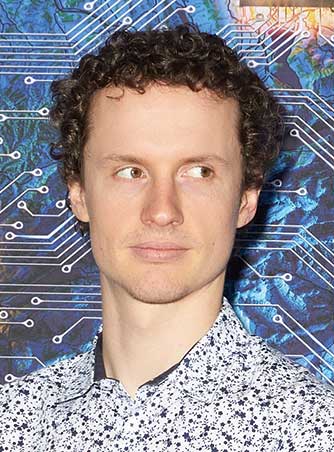This article was published in the Ergon Magazine SMART insights 2023. Order your free copy now.
Giorgio Tresoldi is Head of International Relations and Scouting at the Cyber-Defence Campus run by armasuisse Science and Technology, founded in 2019. He was part of the Swiss success in the Locked Shields exercise, as the curator of both the technology and the team, and the coordinator between the armed forces, research and the academic world. He gives us an insight into the process, and his view of where Switzerland stands as a cyber nation.
What does your job entail?
I comb the global market for ground-breaking cyber security solutions that meet the needs of the Federal Department of Defence, Civil Protection and Sport (DDPS) and the federal administration. High levels of security and protection are key here, of course, but it also involves areas such as data science and machine learning.
How does the Locked Shields cyber defence exercise fit in?
We’re involved in Locked Shields in numerous respects. We advise the Swiss Armed Forces on technologies that might be relevant to the exercise, and are their procurement channel. We also evaluate potential participants. Our research projects give us a network of distinguished experts in all manner of fields. Locked Shields generates a great deal of data, so we help the team to evaluate it. That’s where our huge expertise in data science comes in.
You used Airlock Gateway in the 2022 exercise.
We did. We were interested in using web application and API protection, so we looked around for Swiss suppliers who could provide not only the technology, but also an expert who still had a few days’ military service to complete. Ergon offered just that. It was the perfect combination.

“The focus isn’t on where a company comes from, as long as it delivers the best quality.”
How important is the use of Swiss technology?
The supply chain is becoming increasingly problematic for software as for other products. That is why it helps to keep the chain short. It allows better traceability. That’s what makes Swiss technology important.
Does Swiss software protect us better than other products?
I’m not going to make any sweeping statements. There are good and less good software companies everywhere, and Switzerland is no exception. The focus isn’t on where a company comes from, as long as it delivers the best quality. The new procurement law places greater emphasis on sustainability. Here Swiss companies certainly have great potential. Naturally, however, the WTO rules and the applicable procurement legislation are always adhered to.
How do you assess Switzerland’s readiness to fend off a cyber attack?
It’s difficult to answer that in general terms because we’re talking about a broad range of targets, from three-person SMEs in which one person is in charge of IT, to billion franc big pharma. You can’t lump them together. I can only talk about the federal government and armed forces. In my opinion we are well prepared compared with many countries. But there is always room for improvement.
Where do you think this improvement potential lies?
I think we still have plenty of scope with regard to software that automates certain processes. At the moment we don’t have enough people to look at the data and run projects. If we could increase the level of automation, we could achieve more with the same number of staff.
Which areas are most vulnerable to a cyber attack?
There are different levels and sectors here. Financially motivated crime, for example, targets organisations so that they will pay up. In Spain there were attacks on a hospital, and operations had to be postponed. Hacker gangs of course know that a hospital can’t just shut down.
You mentioned that most of the staff of the Cyber-Defence Campus are still studying.
Each year we run projects for the DDPS with 30 to 40 students and interns. Many of them are doing their PhDs, so they have a sound academic foundation. What we offer in the context of term papers or master’s theses are use cases that are important to Switzerland’s cyber defence. It may well be that the students’ work is later used by the DDPS or federal government to improve those defences. But the Cyber-Defence Campus isn’t just interested in working with the academic world. We also seek out public-private partnerships.
You even offer a Proof of Concept Fellowship, don’t you?
Exactly. It is still in its earliest stages. The aim is to develop a product. Nobody has yet completed the fellowship, but I look forward to getting lots of applications from your readers! The best way is to contact us directly at cydcampus@armasuisse.ch.
Interested in more?
Digitisation projects
Change makers
Tech trends
Order now

